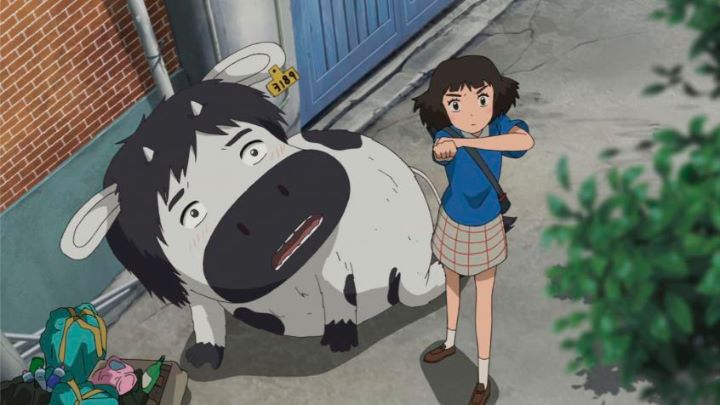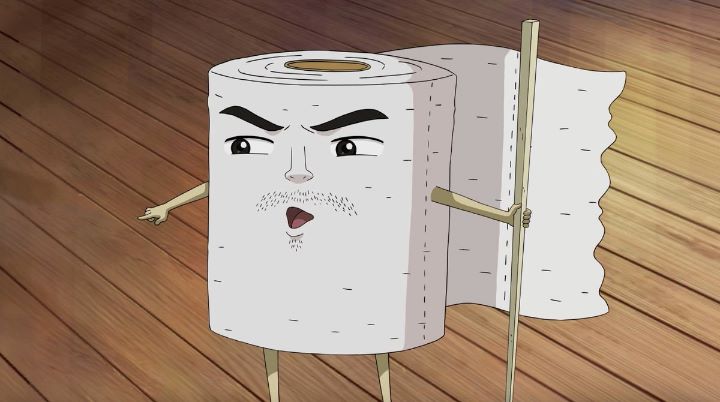






I wouldn't be aware of the 2014 South Korean animated film "Satellite Girl and Milk Cow" until around 2018, when GKIDS ultimately released it with an English dub. I thought the style and premise seemed familar somehow... sure enough, the film was the first feature by director Chang Hyung-yun, but he had already directed a short film called "Coffee Vending Machine and Its Sword." This short film was already available on DVD in North America through Sentai Filmworks as "Coffee Samurai," one of their experimental "feature2" releases to showcase independent short animation. The short film is also a bonus feature on GKIDS' release of "Satellite Girl," making it a rare instance where a short film is readily available on home video through multiple distributors. The director's personal style is clear between the two works. Both have a certain design to their characters, and feature unusual stories of longing portrayed through human characters incarnated into non-human things. In "Satellite Girl," there are a handful of characters that get caught into such strange magic: an outdated and long-out-of-power orbiting satelitte hears a beautiful love song by a human in Korea, and crashes down to Earth to try to find him. The girl is transformed into a girl to better explore, but retains certain quirks of being a robotic appliance. The boy that sang the love song was subject to a hurtful breakup due to a misunderstanding of his relationship to a friend, and his lonely heart causes him to turn into an animal (specifically, a "milk cow," stated fully in dialogue as if Koreans are familiar with other types of cow). There's also Merlin. Yes, THE Merlin, master wizard of lore, the man behind transforming the satelitte girl into a human, and one who, due to embaressing circumstances, exists in present day as a roll of toliet paper. This type of unusual being-bending seems more and more common, with many citizens trying to hide their appearance while others take advantage of the situation: a shady group hunts down animal-humans for their livers, and a wandering towering furnace siliently seeks these animals to feed into its fire. While the story doesn't effectively portray how serious these antagonists are, their goals effectively mean the death of many characters, making this movie much darker than it appears to be. But while there are some action scenes to be had in dealing with them, most of the movie is spent on comedy or romance. The comedy comes from the gag on the poster, of these poor characters trying to survive in states they are unfamiliar with. The romance comes from the complex relationship between the characters: the boy has to get over the loss of his girlfriend, and the satellite has to try to understand her growing feelings of love for the boy, and to make those feelings clear, something that might be difficult to build on between a machine and an animal. Clearly, the director takes inspirations from Hayao Miyazaki and Makoto Shinkai in this movie. Miyazaki's influence can be seen from his movies "Howl's Moving Castle" (the general idea of being transformed into other forms, a moving furnace on legs, and a couple design choices), and in the design of its main antagonist, with a green suit that makes him look like a shifty version of Lupin the Third from "The Castle of Cagliostro." While Makoto Shinkai was still a bit of a niche director by the time "Satellite Girl" was being made, his constant themes of love across impossible boundaries make any of his films an appropriate pairing with this movie. Despite the borrowing of elements, director Hyung-yun has enough of a unique vision to make this work his own. ... but my gosh, it is a flawed work. The story is full of plot holes and threads that never really get addressed with a meaningful conclusion. Despite realitively solid production values and animation, there are plenty of consistency errors in the animation too. This ranges from disappearing characters when they try to walk off-screen, to inconsistent character designs (Merlin's toliet paper appearance with his stubby legs have a variety of issues), to logically impossible animation. For example, despite being a cow, Merlin is able to provide a costume that makes him look perfectly human, except for a large zipper on the back. The satellite girl opens and closes the zipper for a great visual gag, but the way the zipper opens based on her position and where she pulls it doesn't make sense. And the clearly visible zipper never appears again, even though it seemed set up for fun complications when trying to explain things to friends and neighbours. Some story issues were more prominant, such as when the boy finally does turn around to return his feelings to the satellite girl: it seems to occur far too quickly, like a hopeless romantic who would express his love to anything, making the boy seem less human and emotionally real than the robot. This type of thing happens far too often, enough to become noticable and to take me out of the movie. If you were teaching a class on the importance of consistency checks, this film is a perfect example on how not to make a movie. It doesn't help that the film feels much longer than its 81 minute runtime.Had the film undergone more editing at the storyboard stage, perhaps with test screenings, then many of these issues would have been caught and fixed. It's a shame, since the majority of the movie is actually quite good, and there are enough elements to the script that work well. Certain parts of the romance feel ernest, and many physical sight-gags of the satellite girl are funny and memorable enough to justify watching. It's clear that the director has a lot of heart when he works on his movies, and that makes me eager to see what he makes next. But I hope he isn't blind to the flaws in his stories and can improve upon them next time.I will also mention the voice acting and music. Music is an important part of the film, but both the vocal songs and background themes don't stand out particularly well. I will give credit to the English dub, which is well acted enough to elevate the film a bit. They even go so far as to sing Korean lyrics in English to make the songs more accessible for younger audiences. Generally, the acting feels better in English but songs are better in Korean... both are available on the home video release, but if you can only choose one, I recommend English.Ultimately, "Satelitte Girl and Milk Cow" has a few too many flaws to stand up against its Japanese peers, but it has enough heart for me to still recommend giving it a chance.
... but my gosh, it is a flawed work. The story is full of plot holes and threads that never really get addressed with a meaningful conclusion. Despite realitively solid production values and animation, there are plenty of consistency errors in the animation too. This ranges from disappearing characters when they try to walk off-screen, to inconsistent character designs (Merlin's toliet paper appearance with his stubby legs have a variety of issues), to logically impossible animation. For example, despite being a cow, Merlin is able to provide a costume that makes him look perfectly human, except for a large zipper on the back. The satellite girl opens and closes the zipper for a great visual gag, but the way the zipper opens based on her position and where she pulls it doesn't make sense. And the clearly visible zipper never appears again, even though it seemed set up for fun complications when trying to explain things to friends and neighbours. Some story issues were more prominant, such as when the boy finally does turn around to return his feelings to the satellite girl: it seems to occur far too quickly, like a hopeless romantic who would express his love to anything, making the boy seem less human and emotionally real than the robot. This type of thing happens far too often, enough to become noticable and to take me out of the movie. If you were teaching a class on the importance of consistency checks, this film is a perfect example on how not to make a movie. It doesn't help that the film feels much longer than its 81 minute runtime.Had the film undergone more editing at the storyboard stage, perhaps with test screenings, then many of these issues would have been caught and fixed. It's a shame, since the majority of the movie is actually quite good, and there are enough elements to the script that work well. Certain parts of the romance feel ernest, and many physical sight-gags of the satellite girl are funny and memorable enough to justify watching. It's clear that the director has a lot of heart when he works on his movies, and that makes me eager to see what he makes next. But I hope he isn't blind to the flaws in his stories and can improve upon them next time.I will also mention the voice acting and music. Music is an important part of the film, but both the vocal songs and background themes don't stand out particularly well. I will give credit to the English dub, which is well acted enough to elevate the film a bit. They even go so far as to sing Korean lyrics in English to make the songs more accessible for younger audiences. Generally, the acting feels better in English but songs are better in Korean... both are available on the home video release, but if you can only choose one, I recommend English.Ultimately, "Satelitte Girl and Milk Cow" has a few too many flaws to stand up against its Japanese peers, but it has enough heart for me to still recommend giving it a chance.